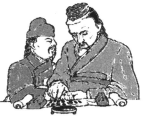
7. Young people should master English and computer (技术) .
 53随堂测系列答案
53随堂测系列答案科目:初中英语 来源: 题型:
() 9. You will be late for school you don't get up early.
A. but B. if C. and D. or
查看答案和解析>>
科目:初中英语 来源: 题型:
3. 郎平挚爱排球,她认为值得为此奉献一生。
Lang Ping loves volleyball so much that she thinks it .
查看答案和解析>>
科目:初中英语 来源: 题型:
四、任务型阅读。(10分)
The ancient Chinese were the first to use fingerprints (指纹) to identify people. They saw that fingerprints were different. When people signed important papers,they put their fingerprints on them. That made the papers lawful.
(指纹) to identify people. They saw that fingerprints were different. When people signed important papers,they put their fingerprints on them. That made the papers lawful.
Skin is an organ. It is the largest organ of the body. There are some things about skin that are the same in everyone.
★Everyone has a dermis (真皮) .This is the inner layer of skin It is alive.
★Everyone has an epidermis (表皮) . This is the part of the skin that you see. It is made up of dead cells.
★Everyone has pores (毛孔) in his or her skin. Pores are tiny openings in the skin. They can let sweat leave the body. Sweat helps to cool the body when the body becomes too hot.
All people have differences in their skin? too. Look at the tips of your fingers. Can you see tiny lines? The lines form a pattera That is your fingerprint. There are names for general patterns in fingerprints. But no two people have exactly the same pattera Only you have the pattern on your finger.
根据短文内容,回答下列问题。
1.Who were the first to use fingerprints?
2. What is the largest organ of the body?
3. What is the epidermis made up of?
4. What's the usage of the pores?
5. Are there two people who have the same pattern?
查看答案和解析>>
科目:初中英语 来源: 题型:
Cloze 9(2014湖北武汉)
There is an old English saying, " Laughter is the best medicine." One person who certainly would have agreed with this is Norman Cousins.
Norman Cousins was the editor of a magazine called Saturday Review for almost forly years. He also 1 and spoke about world peace and anti-war issues (反战议题) ’traveling to many different countries to share his 2 In the 1960s,after returning to the United States from a busy and tiring trip to Europe,Mr. Cousins got 3 . He discovered he had a strange disease that caused great pain in his bones (骨头) .
In less than a week after he got back,he could not 4 it.Ev?ery move that he made was painful. He was not able to 5 at night.The doctors told Mr. Cousins that they (lid not know how to cure (治 疗) his problem and he might never 6 the illness. Mr. Cousins,however,refused to give up hope.
Mr. Cousins thought that the illness could he caused by 7 thoughts. He did not want to take 8 to cure himself. Instead,he felt that happy thoughts or laughter might cure his illness.
He began to experiment on himself while still in the hospital by watching comedy shows on television. Mr. Cousins quickly lound that ten minutes of 9 laughter during the day gave him two hours of pain-free sleep at night.
Deciding that the 10 could not help him,Mr. Cousins left the hospital and checked into a hotel room where he could 11 his experiments with laughter. For eight days,Mr. Cousins 12 in the hotel room watching comedy shows on television,reading amusing books,and sleeping whenever he felt 13 . Within three weeks,he felt well enough to take a vacation to Puerto Rico where he began running on the beach for 14 After a few months,Mr. Cousins was 15 to carry on his work.He had laughed himself back to health.
1.A. laughed B. taught C. wrote D. copied
2.A. magazines B. subjects C. photos D. ideas
3.A. rich B. sick C. lonely D. famous
4.A. stand B. realize C. face D. improve
5.A. dream B. eat C. shout D. sleep
6.A. go through B. look after C. get over D. find out
7.A. unhappy B. pleasant C. silly D clever
8.A. food B. time C. medicine D. money
9.A. unusual B. false C. real D. wild
10. A. friends B. laughter C.experiment D. doctors
11.A. begin B. end C. continue D. report
12.A. rested B. worked C. studied D. played
13.A. well B. tired C. afraid D. worried
14.A. help B .exercise C. freedom D. fun
15.A. able B. safe C. lazy D. un
查看答案和解析>>
科目:初中英语 来源: 题型:
9 .With this equipment,you can (探索) a new world of adventure and underwater beauty!
查看答案和解析>>
湖北省互联网违法和不良信息举报平台 | 网上有害信息举报专区 | 电信诈骗举报专区 | 涉历史虚无主义有害信息举报专区 | 涉企侵权举报专区
违法和不良信息举报电话:027-86699610 举报邮箱:58377363@163.com